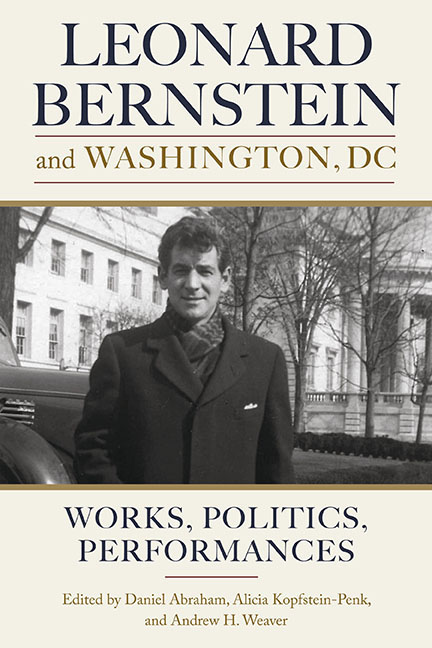9 - Songfest: Bernstein's Monument to American Diversity
Published online by Cambridge University Press: 28 April 2020
Summary
Leonard Bernstein's Songfest derives its connection to Washington, DC, from its premiere there in October 1977, in an all-Bernstein concert just after Mstislav Rostropovich had become music director of the National Symphony Orchestra. Commissioned as a bicentennial work, perhaps by the Philadelphia Orchestra, Bernstein completed Songfest too late for that purpose because he needed to work on the Broadway musical 1600 Pennsylvania Avenue, which closed quickly in May 1976. Songfest came at a critical juncture in Bernstein's personal life: in the summer of 1976 he decided that he would try to live as a gay man and left his wife of twenty-four years to be with Tom Cothran (1947–87). Cothran helped Bernstein choose the diverse texts set in Songfest, which include works by American poets from the seventeenth through twentieth centuries representing varied ethnic and personal backgrounds, a chance for Bernstein to show his support for Others in American society. He also used some texts that spoke to him powerfully at that moment. Nicholas Alexander Brown has called Songfest “one of the most poignant manifestations of Bernstein's beliefs.” The composer applied his characteristic eclecticism to the settings, producing a distinctive cycle of songs, now seldom heard, partly because it requires six vocal soloists with large orchestra. This essay considers the work's composition, the diverse themes of its texts, and Bernstein's eclectic music.
Bernstein was a lifelong liberal. As Barry Seldes has demonstrated, he “never deserted his progressivism.” Bernstein experienced the excitement of the American bicentennial, but he regarded it with ambivalence. His family had lived the immigrant American Dream. The parents, Samuel and Jenny Bernstein, came to the United States more or less penniless. His father started a barber and beauty supply business that allowed them to live comfortably and send their three children to fine universities. Although members of the family surely felt grateful for the opportunities afforded them in the United States, they also knew the sting of anti-Semitism. Leonard Bernstein flirted with Marxism as a young man and lent his name to many progressive and antifascist groups in the 1940s, activities that brought him to the attention of anticommunists. As discussed in chapter 3 of this volume, he had difficulty renewing his passport at the height of the McCarthy era.
- Type
- Chapter
- Information
- Leonard Bernstein and Washington, DCWorks, Politics, Performances, pp. 209 - 236Publisher: Boydell & BrewerPrint publication year: 2020



